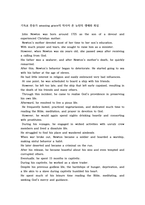기독교 찬송가 amazing grace의 작사자 존 뉴턴의 생애와 회심
John Newton was born around 1725 as the son of a devout and experienced Christian mother.
Newton's mother devoted most of her time to her son's education.
With much prayer and tears, she sought to raise him as a minister.
However, when Newton was six years old, she passed away after receiving a calling from God.
His father was a seafarer, and after Newton's mother's death, he quickly remarried.
After this, Newton's behavior began to deteriorate. He started going to sea with his father at the age of eleven.
He had little interest in religion and easily embraced very bad influences.
At one point, he was scheduled to board a ship with his friends.
However, he left too late, and the ship that left early capsized, resulting in the death of his friends and many others.
Through this incident, he came to realize God's providence in preserving his own life.
Afterward, he resolved to live a pious life.
He frequently fasted, practiced vegetarianism, and dedicated much time to reading the Bible, meditation, and prayer in devotion to God.
However, he would again spend nights drinking heavily and consorting with prostitutes.
During his voyages, he engaged in wicked activities with unruly crew members and lived a dissolute life.
He struggled to find his place and wandered aimlessly.
When war broke out, Newton became a soldier and boarded a warship, making sinful behavior a habit.
He later deserted and became a criminal on the run.
After his release, he became boastful about his sins and even tempted and corrupted others.
Eventually, he spent 15 months in captivity.
During his captivity, he worked as a slave trader.
Despite his previous godless life, the hardships of hunger, deprivation, and a life akin to a slave during captivity humbled his heart.
He spent much of his leisure time reading the Bible, meditating, and seeking God's mercy and guidance.
He was particularly moved by certain passages, especially the parable of the prodigal son in Luke 15, where he identified with the prodigal son and saw in it an illustration of God's mercy and the love of the Father who runs to embrace the returning sinner.
He continued to offer many prayers and thought that if he could die as a believer, he would be satisfied even if he had nothing to eat.
Before arriving in Ireland, he found substantial evidence that satisfied him about the truth of the Gospel and the exact suitability of the Gospel that fulfills all his needs.
He accepted the profound principle that "God appeared in the flesh to reconcile the world to Himself."
"I was once blind, but now I see," he said.
Now, he regretted his misspent past life, valued the Word of God, and was no longer the profligate he used to be.
However, his transformation was not without struggle.
His speech was often empty and foolish, and he frequently had sinful thoughts.
He quickly fell back into a life of depravity, other than blasphemy against God.
He became a vile swearer, not content with the usual curses and oaths but inventing new profanities every day.
Moreover, he, who had worked as a common laborer alongside slaves during his time in captivity, now became a ship's captain, buying and selling slaves.
But God's time had not yet come for him.
He encountered a severe storm on his way back home after giving up the slave trade.
The ship was wrecked, and in this desperate situation, he cried out, "Lord, have mercy on us."
He recalled Scripture and feared for the fate of his soul as death approached.
But he did not yet have a complete realization of his sins.
In a dark time of desperation and impatience mixed with despair, he waited for the worst, thinking that if God were alive, he could not be forgiven.
However, God had mercy on Newton's unrepentant soul.
The ship was saved from the peril of the waters.
Newton believed it was God's hand and began to pray earnestly.
However, he couldn't pray in faith. He couldn't address God as Father.
His prayers sounded like the cawing of a crow. But the Lord did not despise his prayers and heard them.
After four weeks of the shipwreck, Newton and the crew were all rescued.
Through this experience, he came to know the existence of a God who hears and answers prayers.
He realized that anyone, no matter how great a sinner, could receive God's grace and meet the gracious God.
This was a significant turning point in his life. He embraced Jesus as his Savior and became a servant of God.
"The Lord has shown me how pitiful I am, that I cannot stand for an hour without fresh strength and grace from Him," he said.
He continued to engage in ministry, writing hymns like "Amazing Grace" and sharing the message of God's grace to sinners.
In 1807, on December 21, just a month before his death, he said, "Dying is a great thing, and to die in the flesh and mind when our hearts are set on eternal life, worshipping God forever, is a great thing."
He knew that, by God's grace, a






 분야
분야


